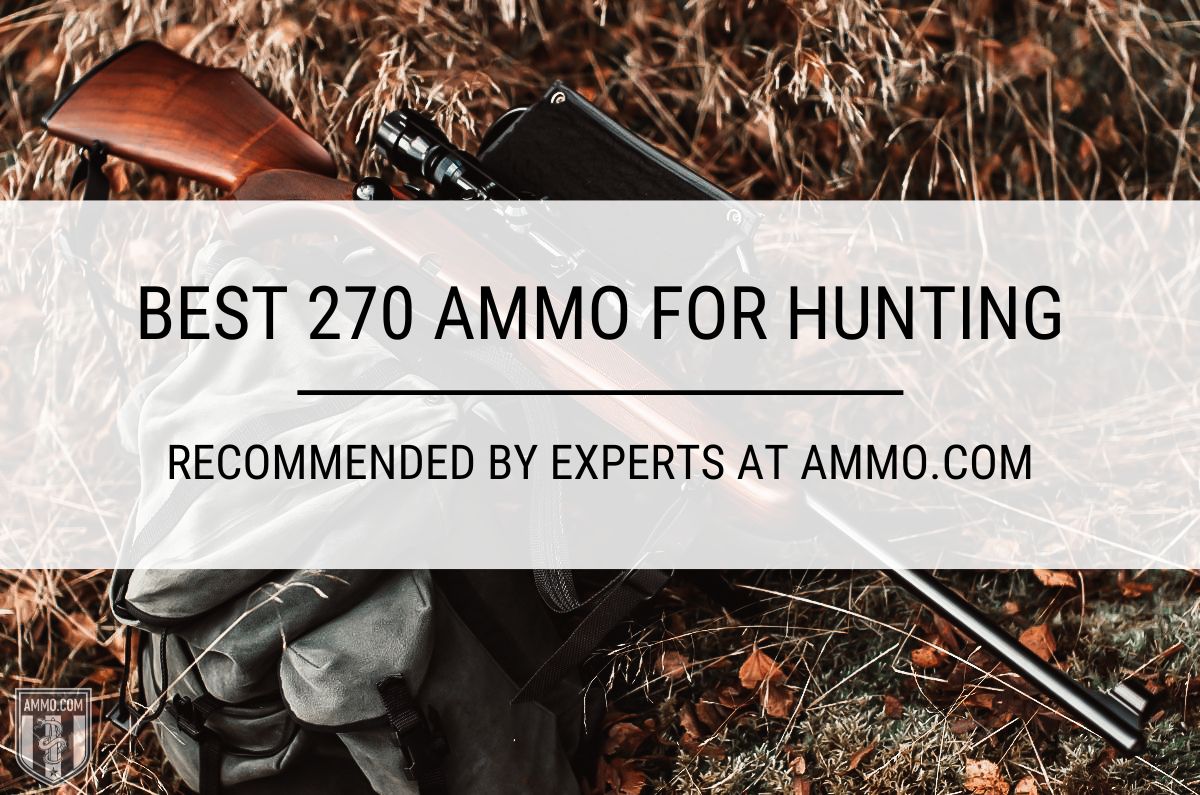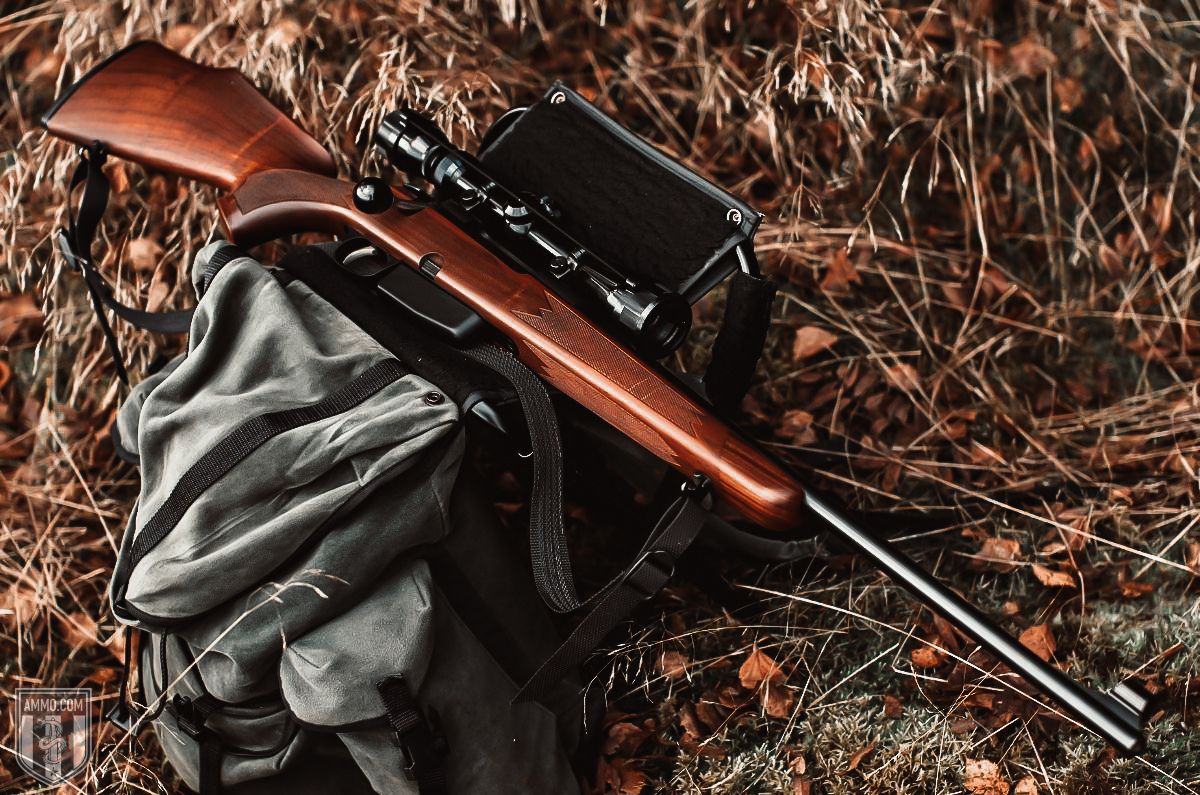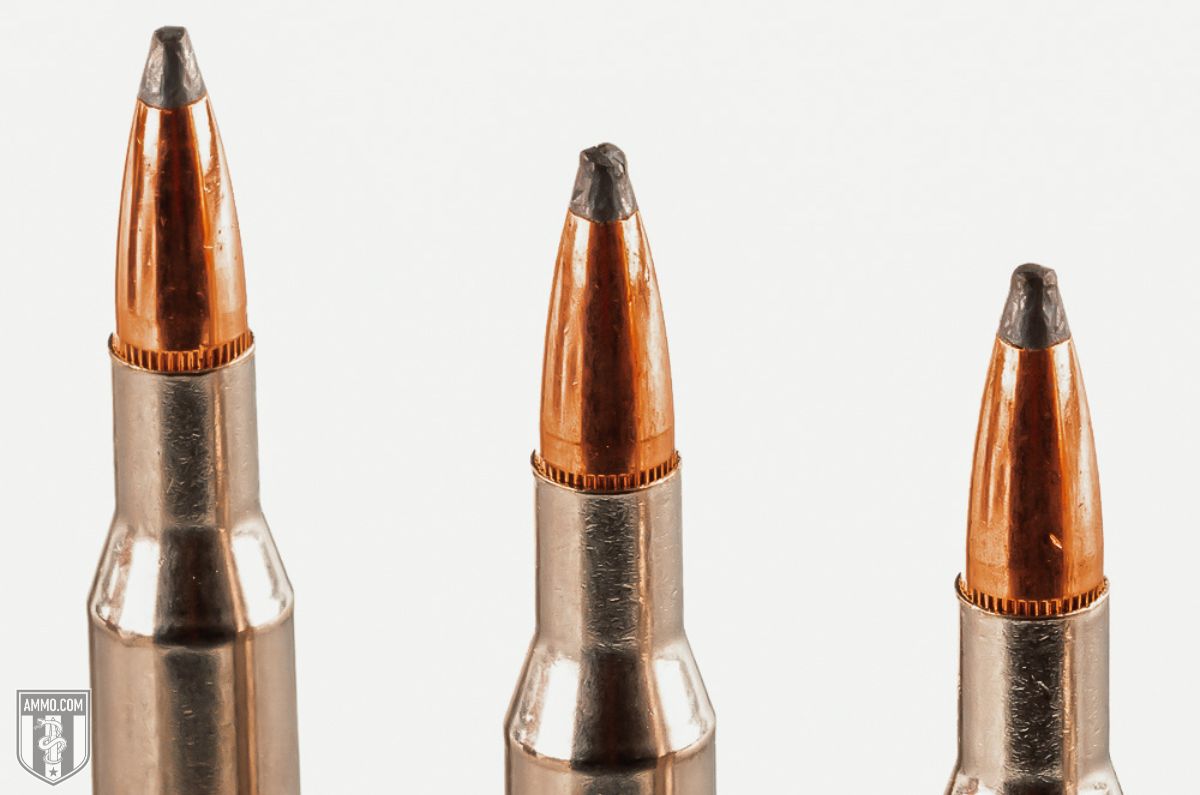
The .270 Winchester, not to be confused with the 270 WSM, is used primarily for hunting, whether deer hunting or big game hunting, such as for elk.
The best 270 ammo is Hornady Superformance SST because it has enough knockdown power to suffice for most hunting situations, is very reliable, and is trusted by many hunters and shooters.
However, it’s expensive, so if you’re in the market for a 270-round that’s a little cheaper but offers similar ballistics, keep reading because we have many more options in stock at Ammo.com!
Best .270 Ammo Overall
Hornady Superformance 270 Win 140 Grain SST
Specs
- Bullet Weight: 140gr
- Casing Type: Brass
- Muzzle Velocity: 3,090 fps
- Muzzle Energy: 2,968 ft-lbs
Pros
- Trusted brand
- High velocity
- High muzzle energy
- Great all-around bullet weight
Cons
- Expensive
Why We Chose It
Hornady Ammunition is a brand trusted by shooters and hunters for the last several decades. They produce high-quality ammunition, so you know it will fire when you pull the trigger and cleanly cycle.
The ballistics are exactly what you should expect from a middle-weight bullet. It’s fast, not the fastest, because it’s not a light bullet, and it packs more punch than the lighter bullets.
The 140-grain bullet is excellent for pronghorn, whitetail deer, and mule deer hunting. However, it’s a little bit light for elk hunting, but with a well-placed shot, it can ethically harvest an elk.
The biggest drawback is you will pay a higher price for better ammunition like Hornady Superformance 140 Grain SST, which is expected.
Honorable Mentions
The Black Hills Gold 270 Win 130 Grain TSX is worth mentioning because, despite being expensive, it has a unique bullet design that offers better performance to hunters. TSX bullet is solid copper instead of a lead core. Solid copper maintains structural integrity much better than lead, which leads to more ethical kills while hunting.
The downsides are the price, the lighter bullet, and the ballistics are not where we’d expect them to be with a lead bullet.
If you’re looking for a slightly less expensive round, the Remington 270 Win 130 Grain PSP is what you should consider. The pointed soft point helps with bullet aerodynamics compared to the traditional soft point, and the ballistics are right where we’d expect them to be for this bullet weight.
These rounds are still on the pricey side of the spectrum, but for hunting, I usually err on the side of caution and choose the more expensive rounds.
Best 270 Ammo for Elk Hunting
Federal Vital-Shok 270 Win 150 Grain Nosler Partition
Specs
- Bullet Weight: 150gr
- Casing Type: Brass
- Muzzle Velocity: 2,830 fps
- Muzzle Energy: 2,667 ft-lbs
Pros
- Trusted brand
- Faster and packs more of a punch than several other 150gr bullets
- One of the best big-game hunting bullets ever made
- Time tested bullet
Cons
- Expensive
Why We Chose It
Federal is one of the top ammunition manufacturers. For decades, they have made reliable ammunition for most calibers, including the 270 Win.
The 150gr Nosler Partition bullet used by Federal Premium carries enough energy to ethically harvest big game, such as elk, from a few hundred yards away.
Despite being a heavier 270 bullet, it’s fast out of the muzzle. The worst parts about these rounds are the price, and they’re loved by so many shooters they’re difficult to find at times.
If you plan to take your 270 bolt-action rifle elk hunting, grab a couple of boxes of Federal Vital-Shok to give you the best chance of bringing home some elk meat!
Honorable Mentions
For a less expensive round, check out the Sellier & Bellot 270 150 Grain SP. The ballistics don’t match up with more costly rounds, but it offers elk hunters a cheaper alternative with the same bullet weight.
The main reason they’re cheaper is the type of bullet used. It’s a soft-point bullet, which isn’t known for its spectacular ballistics.
Keeping the budget in mind, the Federal 270 Win 150 Grain SP offers slightly better ballistics than the Sellier & Bellot but at an increased price, though it’s not as expensive as the Federal Vital-Shok.
Federal also uses soft-point bullets to lower the price of this round, which are effective hunting bullets but don’t perform as well as other bullet types.
Best 270 Ammo for Deer Hunting
Winchester Deer Season XP 270 Win 130 Grain Polymer Tipped
Specs
- Bullet Weight: 130
- Casing Type: Brass
- Muzzle Velocity: 3,060 fps
- Muzzle Energy: 2,702 ft-lbs
Pros
- Winchester is the namesake of the 270
- Crafted specifically for deer hunting
- Fast
- It packs a punch for a lightweight bullet
Cons
- Less than ideal for anything larger than deer
Why We Chose It
Winchester is credited with the 270, hence the name 270 Winchester, so they better make some of the best ammo available for the .270 Win. The Winchester Deer Season XP offers hunters everything they need to fill their freezers with deer meat this season.
Deer are medium-sized game animals, so they don’t require a large bullet to harvest one ethically. However, the bullet still needs to hit hard and cause the deer to die quickly, which is where the 130-grain polymer-tipped bullets excel.
The polymer tip aids in better flight ballistics and allows for rapid expansion of the hollow point bullet.
They’re reasonably priced, so if you want to spend a day at the range with your deer hunting rounds, you won’t have to take out a second mortgage on your home.
The biggest con is since they’re only 130-grain bullets, they’re less than ideal when hunting anything larger than a mule deer. So if deer or varmint hunting is all you do, the Winchester Deer Season XP 130-Grain should be at the top of your list.
Honorable Mention
A slightly more expensive round that offers identical ballistics is the Federal 270 Win 130 Grain SP. Surprisingly, a soft-point bullet can get the same ballistics as a polymer-tipped bullet.
The main problem I’ve had with soft-point bullets is that they don’t always feed correctly, which damages the bullet, hurting the accuracy and ballistics. However, when they feed correctly, they’re excellent deer-hunting bullets.
Best Value Ammo for the .270 Winchester
Sellier & Bellot 270 150 Grain SP
Specs
- Bullet Weight: 150gr
- Casing Type: Brass
- Muzzle Velocity: 2,625 fps
- Muzzle Energy: 2,296 ft-lbs
Pros
- Inexpensive
- Quality ammo
- It can be used for many hunting scenarios and target shooting.
Cons
- Less than ideal ballistics
- The larger 150-grain bullet has a little more recoil
Why We Chose It
The Sellier & Bellot 150 Grain SP is reasonably priced, so you can take it out for a day at the range without worrying about going into debt buying ammo. Though it’s some of the cheapest ammo, it’s still reliable, so when you’re hunting, you can trust the round will go off once the trigger is pulled.
The 150gr bullet is large enough to hunt most big game animals, antelope, and decent for any varmint.
The ballistics leave something to be desired, even though it’s a heavy bullet, so it’s expected to be a little slower; the muzzle energy is also lacking, which isn’t the case with bigger bullets.
The larger bullet will also have a little more kick, so your shoulder might get sore after spending the day at the range. However, for the price, these are good rounds.
Honorable Mention
Another inexpensive round, especially when you buy it in bulk, is the Federal 270 Win 150 Grain SP. It has better ballistics than the Sellier & Bellot 150 Grain SP, but it’s also slightly more expensive.
This round also has a soft-point 150-grain bullet, so it’ll be suitable for hunting deer and elk or shooting targets at the gun range.
Which .270 Ammo is Best for You?
The best 270 rifle ammo depends on your situation. Your circumstances, rifle, and budget should all factor into which ammo is best for you.
Circumstances
How you plan to use your 270 rifle cartridges is the most significant factor in determining which ammo is best for you.
If you plan to use it for hunting, as most .270 WIn shooters do, you’ll need to know what you plan on hunting to match the bullet weight and ballistics up with the animal you’re targeting.
A 270 bullet is typically the smallest bullet diameter allowed to hunt elk, so I prefer to use the heaviest bullets available, such as 150gr+, when elk hunting. The downsides to heavier bullets are more recoil and a declining trajectory.
If that’s your concern, you might consider stepping up to a 300 Win Mag or 6.5 Creedmoor for long-range hunting situations.
When deer or pronghorn hunting, a smaller, faster bullet will suffice because they’re a much smaller animal than an elk. I prefer a 140gr bullet for these hunting situations.
A 130-grain bullet is more than capable of stopping any varmint in its tracks. It’s also nice to have increased speed when hunting varmints because most are small, quick, and easy to miss.
I primarily use my 270 to hunt, so when I take it to the range, I aim to use the same ammo I would while hunting. However, if you don’t plan to hunt with it, using the inexpensive ammo is the best option so you can get more shots for less money.
It’s important to remember whenever you switch brands or bullet weights, you need to re-sight your rifle scope.

Rifle
My hunting rifle is picky regarding which hunting cartridge it likes to cycle. As I mentioned earlier, sometimes it doesn’t correctly cycle soft-point bullets, so I purchase a little more expensive 270 ammo to get better-quality bullets.
It’ll depend on your rifle, the brand, and bullet it likes best. You might not have any trouble cycling rounds, but you might find that you’re much more accurate with a specific round compared to others.
Budget
Finding 270 Winchester ammo for sale within your budget is critical. Rifle cartridges quickly get expensive, so it’s wise only to buy the rounds you can afford.
For most 270 Win shooters, it’s okay to pay a little more for the 270 hunting rounds because they don’t shoot them as often as their target rifles. At least, that’s how I justify it with myself and my wife!
For target shooting, unless you compete, using the cheapest ammo is typically the best choice; at least you’ll be able to shoot your rifle more than you would with expensive ammo.
How to Save Money on Ammo
If sticking to the budget is your main concern, you can take a couple of steps to help ease the burden when buying ammo.
The two best ways to save money on ammo are reloading and buying bulk. However, they both initially require a significant amount of money.
Reload
Because the 270 is a centerfire cartridge, it’s easy to reload. Most handloaders reload to save money and control all the controllable variables.
As a reloader, you can dial in the perfect ammo for your rifle to shoot better consistently. It’s excellent to reload if you plan to shoot often because you can save several cents per round, which doesn’t sound like much until you start adding it up with each trigger pull.
However, if you plan to hunt with your 270, it might not be worth the investment of time, money, and equipment to reload because factory ammo will get the job done.
So, in this case, it might be better to buy bulk 270 ammo.
Buy Bulk Ammo
As with when you buy anything in bulk, ammo manufacturers are willing to offer the buyer a better discount when they purchase a large quantity of ammunition.
The size of the discount depends on how much you purchase. So if you buy 200 rounds, you won’t get as good of a deal as you would when you buy 500 rounds.
As I mentioned, the main problem is that you initially need a large sum of money to buy the ammo, but you save money in the long run, typically $0.10 or more.
You can buy in bulk and reload the spent brass if you’re dedicated to saving money. You’re essentially doubling up on your savings, so you can tell your significant other that you’re actually saving money when buying ammo.
Common 270 Bullets
When you purchase 270 ammo, you’ll notice manufacturers use different bullets, which often affects the price.
SP and PSP Bullets
Soft-point (SP) and pointed soft-point (PSP) bullets are commonly found in hunting cartridges because they’re inexpensive and are effective at ethically harvesting various animals, including big game.
Most manufacturers use a soft-point or pointed soft-point bullet, such as Remington Core-Lokt (Remington .270 Ammunition), Winchester Power Point, and Federal Fusion.
SP bullets don’t have the stopping power that hollow points have, but some states don’t allow the use of hollow points, which is why soft-point bullets are so popular among hunters.
PSP bullets often have a boat tail, which offers shooters a flatter trajectory at longer ranges than a traditional SP bullet because it is more aerodynamic.
Nosler Partition Bullets
The Nosler Partition is an exposed lead base bullet with a soft tip. This bullet has a unique design that looks like two bullets combined to create an “H” shape. Except for the tip and base, two cores in the Partition bullet are separated by the copper alloy jacket.
Many still believe it to be the greatest all-around big-game hunting bullet, even though it’s been around for a long time. However, as bullet technology has increased, the use of Nosler Partition bullets has decreased, but you will still see ammo manufacturers using these bullets.
Polymer-Tipped Bullets

Polymer-Tipped bullets have a pointed plastic piece covering the hollow point’s center. This plastic tip makes the bullet much more aerodynamic.
The polymer tip doesn’t interfere with the hollow points’ ability to expand on impact, which is why so many hunters prefer to use polymer-tipped bullets when they have that option.
The Nosler Ballistic Tip is also a Polymer-Tipped bullet. However, Nosler trademarked the name so other manufacturers can’t call their ammo “ballistic-tipped ammo.”
The Nosler Ballistic Tip is used on Silvertip and Nosler AccuBond bullets.
Polymer-Tipped bullets offer hunters many advantages, which means we’ll pay more for them when buying ammo, but it’s often worth it if you’re shooting farther distances. It might not be worth it, though, when shooting short ranges.
SST Bullets
The Super Shock Tip (SST) was created by Hornady and is a favorite of reloaders because of its boat tail design, making it easier to work with while reloading.
It has a polymer-tipped bullet. This tip helps in accuracy and trajectory. The flat trajectory and rapid expansion allow the bullet to take down large game animals.
This is a premium hunting bullet, so if you see ammo labeled SST, you’ll be paying a premium price, but you can also expect top-tier ballistics.
TTSX or TSX Bullets
Triple-Shock X (TSX) and Tipped Triple-Shock X are polymer-tipped bullets made by Barnes.
Commonly referred to as Barnes X bullets, the TSX is Barnes Bullets’ premium hunting rifle ammunition and comes in most rifle calibers.
The TTSX is a redesigned version of the TSX and made improvements on better rapid expansion and the mushroom effect that splits uniformly into four “petals.”
These bullets are very similar to Hornady GMX bullets.
Parting Shots
The 270 Winchester must credit Jack O’Connor for singing its praises and making it one of the primary choices for deer hunters across the U.S.
However, the 270 could back up Jack’s claims, allowing it to remain a favorite of many. As the best 270 ammo has only gotten better since he first picked up a .270 Win, many decades ago, it’s safe to say the 270 isn’t going anywhere any time soon.
If you have a 270 hunting rifle and plan to hunt deer, I highly recommend 130gr Winchester Deer Season XP.
For elk hunting, however, you’ll need the larger bullet of Federal Vital-Shok 150 Grain to get the job done.











































